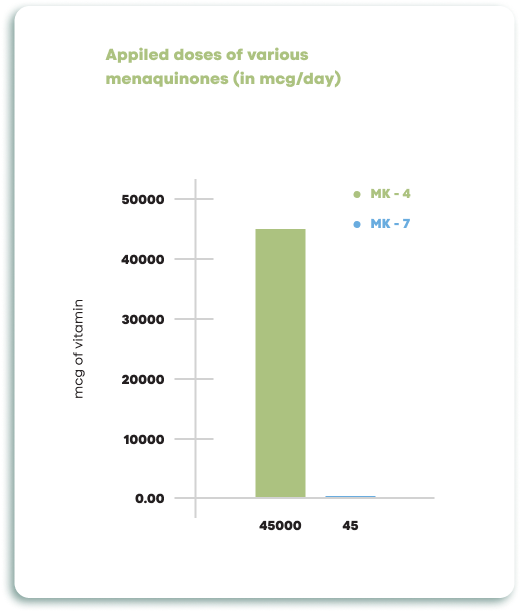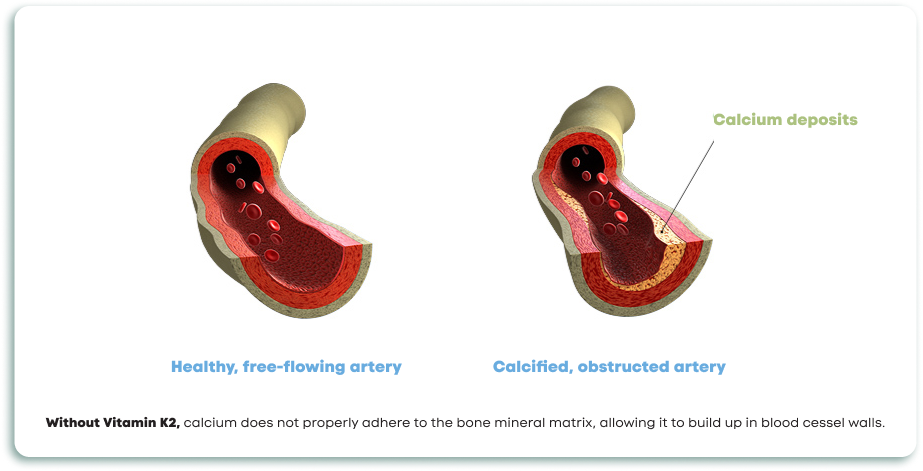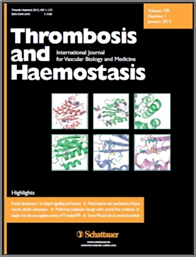Search Results for: Research
Are you getting enough Vitamin K2? If you are eating a Western diet, you likely are not.
Vitamin K occurs naturally in two major forms — Vitamin K1 and Vitamin K2. While Vitamin K1 is found in green leafy vegetables, such as broccoli, spinach and kale, and is easy to incorporate into one’s diet, the more beneficial Vitamin K2 is of bacterial origin and much more difficult to obtain through diet alone.
Vitamin K2 can be produced within the human body by beneficial bacteria colonizing the intestines. However, the intestinal absorption seems to be minimal, contributing little to the body’s vitamin K requirements especially for bones and arteries, and research now indicates that contribution is much less than previously thought.
Therefore, the daily requirement for Vitamin K2 has to be gained from dietary sources, and the most popular sources in Western diets are curd, cheeses, and other fermented dairy products shown to contain Vitamin K2. But one needs to consume extremely high amounts of these foods daily in order to get a sufficient Vitamin K2 intake.
The best source of Vitamin K2 is a traditional Japanese dish made from fermented soybeans called natto, which is uniquely rich in menaquinone-7 (MK-7). As natto remains unpopular in the Western world, supplementation with additional Vitamin K2 is viewed as the optimal alternative.

In general, the typical Western diet contains insufficient amounts of Vitamin K2 to adequately activate the K-dependent Matrix Gla Protein (MGP), which means about 30% of Vitamin K2-activated proteins remain inactive. This amount only increases with age. Further, Vitamin K2 is nearly non-existent in processed “junk” food, and even in a healthy Western diet.
Also of note is that there are currently no recommended intake levels for Vitamin K2 – the only recommended levels are for vitamin K1.
Even the healthiest diets fall short on delivering all the nutrients the body requires to operate optimally.
It has long been believed that vitamin K deficiency is rare due to dietary intake and contribution from microbial biosynthesis in the gut. Yet published studies show that the majority of both children and adults are vitamin K deficient.
Consider that dietary intake data from the 1950s and early 2000 in the UK show that consumption of vitamin K is now lower than it once was – a likely a consequence of changing diets, as well as food supply. For example, between the 1950s and the 1990s, fats and oils became a larger part of most Western diets than vegetables.
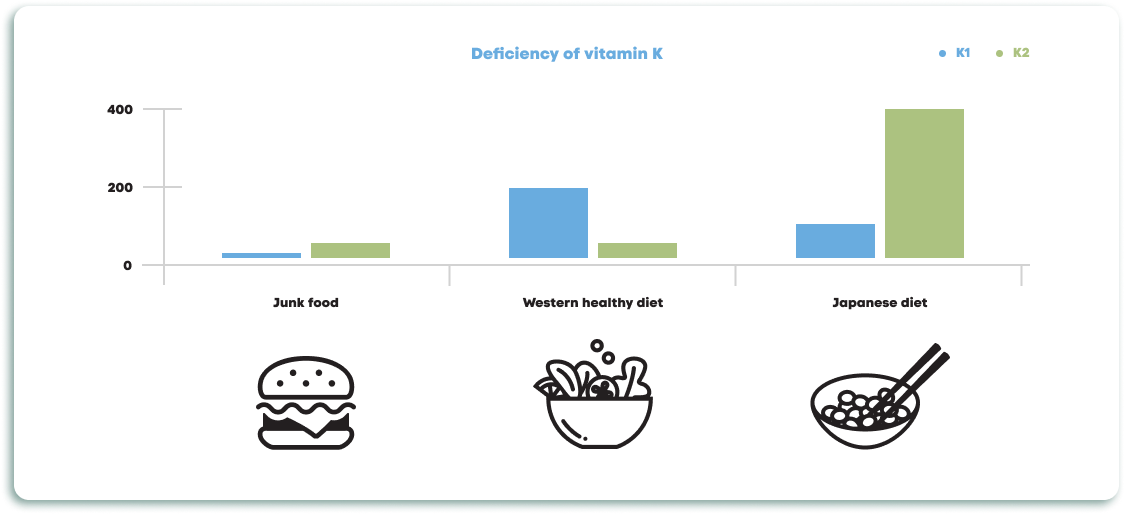
Further, changes in food composition and different preparation practices can also explain deficiencies. Food used to be made in the presence of various bacteria species (synthesizing Vitamin K2). Now, sterile conditions introduced by international standards of food manufacturing stop microorganisms, including beneficial flora, from multiplying and penetrating the human body.
And while it was thought that bacterial synthesis of menaquinones in the colon was a significant contributor to the body’s systemic needs, research now indicates that contribution is much less than previously thought.
Published studies strongly indicate that better Vitamin K2 status contributes to non-calcified, flexible arteries and strong, healthy bones. With a shifting emphasis to fast and processed foods, it is conceivable that vitamin K intakes have been on a significant decline since 1950, which may have serious implications for bone and cardiovascular health.
Vitamin K2 Unrecognized in RDAs
Current daily recommendations for K vitamins are based exclusively on vitamin K1 and the requirement for proper blood clotting, which is presently 1 mcg vitamin K1/kg of body weight (daily). This amount is insufficient for the optimal function of vitamin K-dependent proteins in other tissues like bone and vasculature.
Further complicating the issue is that very few foods contain Vitamin K2 as MK-7. For those that do, we need to eat substantial amounts of those foods daily just to obtain the minimum dosage of 45 mcg to experience any sort of bone or cardiovascular benefit.

Vitamin K was discovered in 1929. The Danish scientist Henrik Dam and colleagues were investigating the role of dietary cholesterol by feeding chickens a diet without fat. After several weeks the animals started to suffer from frequent bleedings. This could not be stopped by adding cholesterol to the diet, so Dam postulated that – together with fat – there had to be another compound in the diet that prevented the bleedings. After years of research he found a factor in hempseed that prevented bleeding, and decided to call it the coagulation vitamin. It was designated in German as “Koagulations” vitamin and that is how the new vitamin got the letter K.
This monumental discovery of Vitamin K earned Professors Henrik Dam and Edward Doisy the Nobel Prize in 1943.

1975
Esmon et al. published the mechanism of action of vitamin K and identified the vitamin K cycle as vital for the activity of carboxylase enzyme.
1989
Vermeer et al. published that vitamin K deficiency influences the ratio of serum uncarboxylated to carboxylated osteocalcin.
1997
Sokoll et al. published that the US dietary vitamin K intake is not sufficient to fully carboxylate osteocalcin.
2001
Schurgers et al. published that inhibition of vitamin K-dependent carboxylation of MGP promotes vascular calcification.
2006
Tsugawa et al. published that MK-7 is the vitamin K form found in serum of women with reduced risk of bone fractures. Later that year Ikeda et al. published that intake of MK-7 is associated with reduced bone loss in post menopausal women in a population-based study (JPOS study).
2007
Schurgers et al. used rats to demonstrate that that arterial calcification and the resulting decreased arterial distensibility are reversible by high intake of vitamin K.
2008
Nimptsch et al. published a large population-based study showing that consuming dairy products containing higher menaquinones like MK-7 reduces the risk of prostate cancer substantially. No such reduction was observed with vitamin K1-containing food. Later, van Summeren et al. showed that a better vitamin K status was associated with more pronounced increase in bone mass in healthy children.
2009
Beulens et al. found among 564 post-menopausal women that intake of Vitamin K2 – but not vitamin K1 – was associated with reduced coronary calcification, and that adequate Vitamin K2 intake could be important for prevention of cardiovascular disease. Shortly thereafter van Summeren et al. demonstrated that modest MK-7 supplementation increases circulating concentrations of MK-7 and increases osteocalcin carboxylation in healthy children, while Gast et al. found that a high menaquinone intake reduces the incidence of coronary heart disease.
2012
Westenfeld et al. confirmed that most hemodialysis patients have a functional vitamin K deficiency. More importantly, they found that inactive MGP levels can be decreased markedly by daily Vitamin K(2) supplementation.
2013
Knapen et al. showed that after three years of supplementation of 180 mcg Vitamin K2 as MK-7 (MenaQ7®) daily, improvements in both bone mineral content and bone mineral density were statistically significant in the MenaQ7® group. Moreover, bone strength was statistically improved. Later that year Theuwissen et al. established the vitamin K status across age groups based on circulating levels of ucOC and dp-ucMGP, i.e. markers for the vitamin K status of bone and the vasculature, respectively. Accordingly, the study classified healthy children and adults above 40 years as groups with prominent vitamin K deficiency and thus appropriate groups for vitamin K supplementation.
2015
Knapen et al. published the first double-blind, randomized, intervention trial where the results confirm that Vitamin K2 intake is linked to cardiovascular risk. Researchers found that, after three years of daily supplementation with 180 mcg Vitamin K2 as MK-7 (as MenaQ7®), it not only inhibited age-related stiffening of the artery walls, but also made a statistically significant improvement of vascular elasticity, especially in women having high arterial stiffness. To date, the effects of increased menaquinone intake on markers of vascular health have been investigated using predominantly food supplements. Therefore, Knapen et al. sought to study the effects of a menaquinone-fortified yogurt drink (as MenaQ7®) on vitamin K status and markers of vascular health in healthy men and postmenopausal women. Results showed MK-7 was efficiently absorbed from the fortified yogurt drink, improving vitamin K status, which contributed to improved cardiovascular health.
K-dependent proteins in the body need to be activated in order to function.
Vitamin K1 is known for its blood-clotting activity. Vitamin K2 also contributes to this process, but Vitamin K2 is now recognized as essential for helping the body to properly utilize calcium in order to build healthy, strong bones and to stop calcium from depositing in the arteries and blood vessels.
Vitamin K2 “makes calcium work” through its ability to activate certain K-dependent proteins already present in the body:
- Osteocalcin is the protein responsible for binding calcium ions to the matrix of bone, making bones stronger.
- Matrix Gla Protein (MGP) is the most potent modulator of arterial calcification known today, and the amount of arterial calcification is an indicator of one’s cardiovascular health.
Natural vitamin K2 as MK-7 is the essential cofactor for the enzyme γ-carboxylase which is able to carboxylate these calcium-regulating proteins making them able to form calcium-binding groups essential for their biological activity. By controlling these proteins in vascular tissue, vitamin K2 keeps calcium out of the arteries and drive it to bones.
Research has found that osteocalcin was undercarboxylated by 40% in postmenopausal women when compared with premenopausal women. Uncarboxylated matrix Gla-protein is associated with the increased vascular calcification and cardiovascular disease.
When the body has sufficient Vitamin K2, calcium is directed to where it is needed, and kept away from where it is not.

Vitamin K deficiency results in impaired bone strength and mineral density.

Calcification increases vessels’ stiffness and fragility, impeding healthy blood flow to and from the heart.
However, inadequate Vitamin K2 may result in what is known as the “Calcium Paradox.” This is where the bones receive too little calcium (leaving them weak and brittle) as excess calcium deposits in the arteries and blood vessels (making them stiff and inelastic).

Vitamin K2 is the powerful component in transporting “excess” calcium out of the arteries and blood and depositing it into our bones.
The link between Calcium, Vitamin D3 and Vitamin K2
While Vitamin K2 as MK-7 is essential for activating calcium-binding proteins, Vitamin D3 plays a vital Role in synthesizing these proteins and aiding with calcium absorption.

The two most important forms found in food are vitamin K1 (phylloquinone) and Vitamin K2 (menaquinone).
K vitamins are a group of fat-soluble vitamins. The two most important forms found in food are vitamin K1 (phylloquinone) and Vitamin K2 (menaquinone). Vitamin K1 is known for its role in blood coagulation (clotting). Vitamin K2 also contributes to coagulation, but more importantly, it is a form newly recognized for its essential role in building and maintaining strong bones, as well as inhibiting calcium deposits in the arteries and blood vessels.
Supplemental Vitamin K2 exists in several forms, but the most common ones are the synthetic menaquinone-4 (MK-4) and the natural menaquinone-7 (MK-7).
MK-7 is the superior form of vitamin K
All K vitamins are similar in structure, but differ in the length of the “side chain” – the longer the side chain, the better effect and efficiency. Consequently, the long-chain menaquinones (especially MK-7) are the most desirable as they are nearly completely absorbed (body requires smaller doses) and stay in the blood for the longest time. This makes Vitamin K2 also available for tissues outside the liver, namely bones, arteries, and soft tissues.
In fact, studies consistently show that Vitamin K2 as MK-7 is much more effective compared to MK-4. This is mainly due to MK-7’s significantly greater:
- Absorption & Half-Life Time
- Accumulation in the Serum
- Efficacy
Absorption & Half-Life Time
Both Vitamin K2 as MK-4 and MK-7 are nearly completely absorbed, with peak serum concentration at 2 hours for MK-4 and 4 hours for MK-7 after intake. However, MK-4 quickly disappears from the circulation, whereas MK-7 is capable of accumulating in the bloodstream (remaining in the body for approximately 72 hours). Therefore, supplementation with MK-7 only needs to be taken once a day and is a more convenient option.

Accumulation in the Serum
The long half-life of MK-7 results in significantly better accumulation compared to MK-4. Research shows that MK-7 has better absorption. Hence, smaller quantities and less frequent intakes of MK-7 are sufficient to supply all of the tissues.
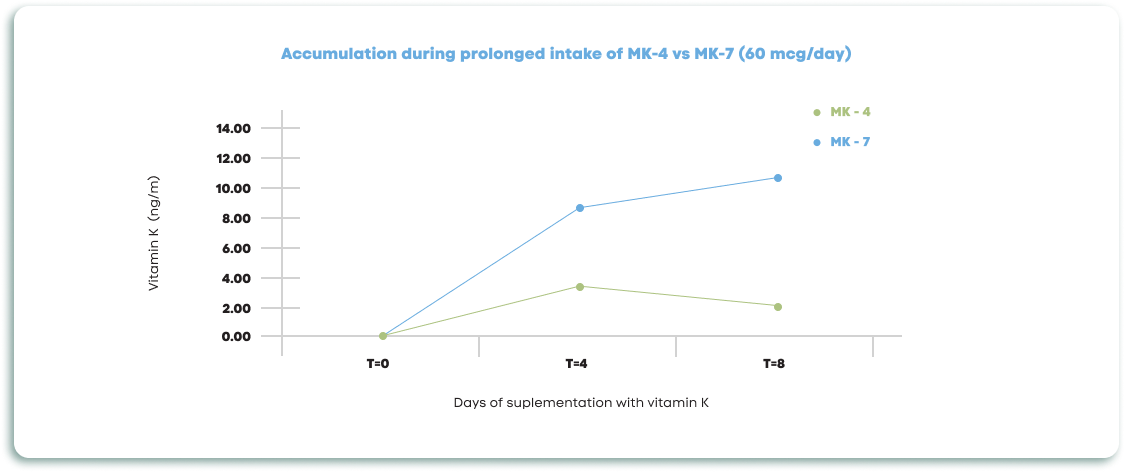
Efficacy
45mcg/daily of MK-7 is proven to be sufficient in order to increase the carboxylation process and the activation of vitamin K-dependent proteins such as Osteocalcin for bone health and Matrix Gla Protein (MGP) for heart health.
